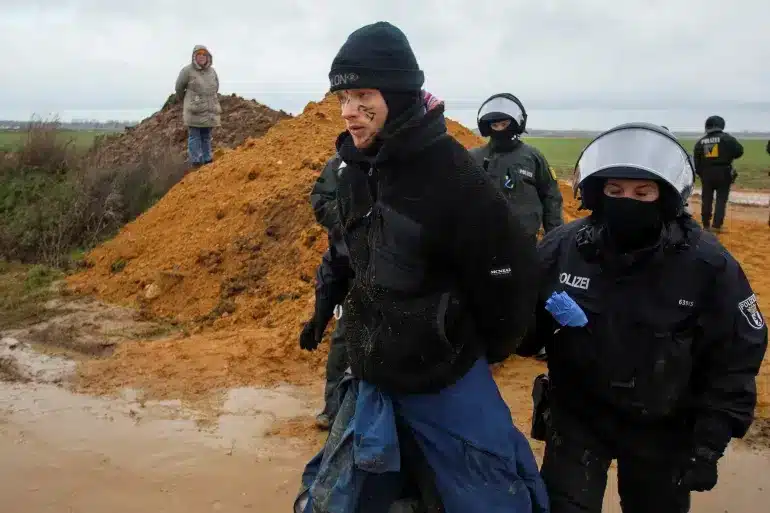Activists vow to continue defending Luetzerath village in an effort to stop the Garzweiler mine’s expansion.
In a standoff over the expansion of a coal mine, German police have started evicting climate protesters from a deserted village.
Officers in riot gear entered Luetzerath on Wednesday morning, where hundreds of protesters had camped out in an effort to halt the expansion of the nearby RWE-operated Garzweiler coal mine.
In a standoff that highlights the tensions surrounding Germany’s climate policy, activists have been attempting to stop the village from being bulldozed to make way for the opencast lignite mine for the past two years.
Environmentalists say bulldozing Luetzerath would result in huge amounts of greenhouse gas emissions, but the government and RWE say coal is needed to ensure Germany’s energy security.
The protesters on Wednesday formed human chains, made a makeshift barricade out of old containers, and chanted “We are here, we are loud, because you are stealing our future”.
Some protesters threw beer bottles at the police. Officers said Molotov cocktails and stones were also hurled at them.
Al Jazeera’s Step Vaessen, reporting from Luetzerath, said protesters were “holding firm”.
“[Police] are in the streets, where the few houses of Luetzerath that remain are still standing,” she said. “Villagers left quite a while ago, but the village has been occupied for the last two years by climate activists.”
Luetzerath has become “an international symbol for the fight against climate change” because dozens of villages have been destroyed over the years to make way for this mine, she said.
“Now Luetzerath has to go as well, that is the government’s decision.”
‘We are here and we will stay’
Two days earlier, a regional court upheld an earlier ruling to clear the village, which is in the brown-coal district of the western state of North Rhine-Westphalia.
RWE, the company which owns the village’s land and houses, said on Wednesday it would start to demolish the remaining buildings.
“RWE is appealing to the squatters to observe the rule of law and to end the illegal occupation of buildings, plants and sites belonging to RWE peacefully,” it said in a statement.
“Nobody should put their own health and life at risk by participating in illegal activity.”

Dina Hamid, who is protesting in Luetzerath, said the demonstrators are “prepared to stay” despite the police presence.
“We are squatting in all of the different structures in Luetzerath, and we are staying here because 280 million tonnes of coal are still supposed to be extracted from the Garzweiler mine,” Hamid said.
“We cannot stand that. We cannot stand that people are dying from the climate crisis right now, that’s why we are here and we will stay.”
Growing tensions over climate policy
Environmentalists say Germany’s climate policy has taken a back seat as Europe grapples with an energy crisis, in part driven by Russia’s invasion of Ukraine.
For many European nations, the crisis is forcing a return to dirtier fuels.
This is particularly sensitive for the Greens, a party now back in power as part of Chancellor Olaf Scholz’s coalition government after 16 years in opposition until 2021.
The fallout of Russia’s offensive has prompted Scholz’s government to change course on previous policies.
Germany is now firing up mothballed coal power plants and extending the lifespan of nuclear power stations after Russia cut gas deliveries to Europe in an energy standoff that sent prices soaring.
The government has, however, brought forward the date when all brown coal power plants will be shut down in North Rhine-Westphalia, to 2030 from 2038, a campaign promise from the Greens.
The Garzweiler mine extracts about 25 million tonnes of lignite every year, according to RWE. The company has said it supports energy transition and a temporary increase in the use of lignite-fired plants to tide Germany through the energy crisis.

